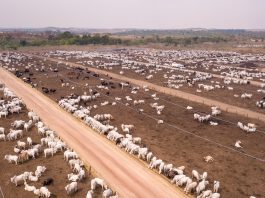The illegal timber trade imposes astronomical financial and environmental devastation worldwide; now, iov42 have developed a blockchain operating platform to eradicate this global issue.
Annually, the international illegal timber trade is worth $50Bn to $150Bn, with the UN Environment Programme estimating that between 15% to 30% of timber is obtained illegally. Complex, international supply chains make it almost impossible for businesses, individuals, and governments to know whether their wood has been sourced in compliance with local regulations, which often mandate some degree of environmental and social sustainability. Now, a novel blockchain operating platform may eliminate this worldwide problem.
The scope of the illegal timber trade
In early 2020, non-profit-organization Earthsight published a comprehensive report following an 18- month-long investigation into Ukraine’s forest sector that identified deep-rooted problems that have resulted in billions of dollars in lost revenue and severe ecological threats:
- Circumvention or ignoring of environmental regulation: The abuse of “sanitary felling” loopholes and, in other cases, the outright disregard of For example, harvesting during silent periods, logging without permits, and no prior environmental impact assessment are rampant issues
- Use of “ghost employees”: Many forest enterprises try to disguise illegal activities by naming people who do not work there in reality or who have died as employees
- Illegal exports: Cheap, illegally exported timber drives down legal timber prices, resulting in a $10Bn loss for the legal timber industry. Moreover, the loss of tax revenues costs governments an extra $5Bn
Particularly in developing and countries that are prone to corruption, forests are suffering from an epidemic of illegality. For example, illegal timber is estimated to account for 50% – 90% of wood harvested from Amazonia, central Africa, and Southeast Asia. Interpol estimates that 40% to 60% of timber exports from Indonesia, 25% from Russia, and 70% from Gabon are illegal. At the same time, certification authorities have been found to often be ineffective in auditing supply chains and certifying compliance with regulation and additional standards.
The blockchain operating platform solution
The technology designed by iov42 provides a system that promotes transparency and accountability along the supply chain, ensures regulatory compliance, and improves supply chain integrity. This minimises the risk of arbitrary and baseless felling decisions and will instead promote data-driven decision-making and provides a transparent audit trail of actions. The system imparts blockchain digital identities to each of the stakeholders that are part of the supply chain (be it an individual or an organisation) and represents timber as digital assets.

The stakeholders use their digital identities to record timber information on each step of the supply chain — forest, sawmill, kiln drying facility, and supplier facility — allowing the buyer to trace the journey of the timber they have bought and see if it comes from a legal, certified source. This enables full accountability, as the buyer can check which stakeholder approved the timber at each step, making the supply chain fully transparent. The system also traces the changes in timber volume along the supply chain to ensure that no additional timber is being inserted in the supply chain from unknown sources.
The system is centred around three main pillars:
- Decisions based on verified data: The system requires every decision on whether to fell a tree to be based on verified data that is immutably secured on the blockchain;
- Transparency and accountability: iov42’s identity-centric platform identifies every actor and provides a transparent audit trail of actions;
- Tracking wood from forest to the shelf: In combination with nanotechnology, it provides an effective way of monitoring wood along its entire
These features of unique blockchain architecture enable the solution:
- Claims and endorsements ensure that decisions are based on objective data verified by trusted sources;
- Identity modelling guarantees that all parties are known and auditable;
- Permission modelling allows authorised individuals to act on behalf of organisations;
- The ledger’s immutability enables the creation and storage of complete audit trails of actions that were performed, as well as linking individuals or organisations that completed them;
- A zoned architecture allows flexibility in reacting to country-specific regulation.
In effect, the system serves as an effective instrument to reduce the risk of illegality to a negligible level, in compliance with the EU Timber Regulation. This blockchain-based system perfectly complements existing efforts to verify supplier compliance with legality by preventing immense losses due to fraud, improving integrity in supply chains, and emphasising a continued commitment to sustainability.









